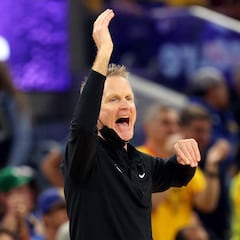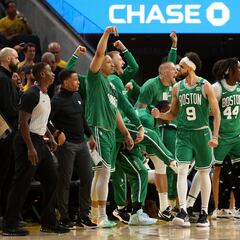NBA Finals: what changes might Warriors and Celtics make? Green, Tatum...
With three days to prepare between Game 1 and Game 2, we look at some potential adjustments, as well as a Warriors storyline to watch.

The Boston Celtics stole home-court advantage with their impressive win against the Golden State Warriors in Game 1 of the NBA Finals – but it is a long series, and both teams have some adjustments to make.
In the Celtics’ 120-108 victory, Jayson Tatum did not shoot the ball well (three-of-17 from the field), but made up for it with his playmaking, dishing a career-high 13 assists to take advantage of an outlier shooting performance from the rest of his team.
For the Warriors, a dynamic 38-24 third period had them leading by 12 heading into the last, before a fourth-quarter bombardment saw a 103-100 lead turn into a 117-103 deficit courtesy of a 17-0 run.
Stephen Curry was spectacular, with 21 points and a Finals-record six three-pointers in just the first quarter, going on to finish with 34 points, five rebounds, five assists and three steals.
With Game 2 scheduled for Sunday night, here is one key adjustment we could see from both teams as the series progresses, and a storyline to watch.
The Warriors matched Curry's constant movement with a Porter screen, Clarke had a long way to go to cover for Bane, Curry just let's him fly by before getting his shot off. I have no idea how the Warriors are just down two pic.twitter.com/3menZoLKW8
— Mo Dakhil (@MoDakhil_NBA) May 8, 2022
Warriors play no more than one big at a time
When the Warriors were at the peak of their dynasty, Draymond Green would play center, surrounded by four perimeter players.
Due to his excellent play this postseason – as well as playing all 82 regular season games, starting 80 – center Kevon Looney has earned a significant playoff role.
He was the difference-maker when trusted with an extended run in his side’s Game 6 closeout against the Memphis Grizzlies, collecting 22 rebounds, and he was terrific against a Dallas Mavericks side lacking a true center, averaging 10.6 points, 10.6 rebounds and three assists per game for the series.
To put the blame of the Game 1 loss on Looney is simply wrong. He was not just serviceable, he was good, with nine rebounds, five assists and three blocks in his 25 minutes – but the Warriors are simply not the same beast on the offensive end when he and Green are on the floor at the same time.
However, this does not mean they must bench Looney, but instead the Warriors may be forced into some difficult conversations about the effectiveness of Green in this series.
Green is no longer the explosive athlete he was at the peak of his powers – when he was clearly the best defensive player in the NBA – and without that athleticism he begins to feel like the 6′6 center that he is.
Calling him a non-factor on the offensive end is disrespectful due to his incredible basketball IQ and the value he adds with his ball-movement, passing and screening – but these are areas Looney has quietly excelled in as well.
Looney, significantly bigger at 6′9, matched Green with five assists, showing plenty of similar reads and the ability to function in a largely similar role on the offensive end. He also grabbed six offensive rebounds, providing serious tangible value in the form of extra possessions, while also being the Warriors’ only real rim protector.
Green will likely not shoot two-of-12 from the field again – missing all four of his three-point attempts and all three of his free throws – but if he is weighing you down offensively while not bringing his once-outlier defensive ability, it just may be a Looney series against the real size of Al Horford and Robert Williams III.
☔️☔️☔️
— Golden State Warriors (@warriors) June 3, 2022
📺 #NBAonABC pic.twitter.com/W6G5SQbtfn
Celtics move Tatum off-ball
Tatum had a woeful shooting performance in Game 1, but all was forgiven because as a team the Celtics shot 21-of-41 (51 per cent) from three-point range.
Needless to say, that kind of efficiency is not even close to sustainable. Horford drained a career-high six threes, Derrick White hit a season-high five threes off the bench, and the hot-and-cold Marcus Smart hit four-of-seven.
If it was not for their fourth-quarter explosion, the Celtics would be down 1-0, heading into Game 2 with one focus: how do we get Tatum easier chances to score.
Tatum’s advancements in his ball-handling and his ability to run pick-and-roll has been transformative for Boston, solving their long-held problem of a lack of point guard play, but it comes at a cost.
When he begins the majority of his possessions dribbling the ball close to half-court, it allows the entire defense to prepare for the inevitable drive to the rim, with or without a screen, and arrive in plenty of time with help-defense, or just straight-up double-team him.
What that does is force Tatum to give the ball up early in possessions, and in Game 1, his supporting cast were able to hit shots and make plays without him to punish the Warriors.
The Celtics cannot rely on outlier shooting to win games – and absolutely cannot plan to out-shoot the Warriors – so if Golden State stay committed to their strategy of forcing the ball out of Tatum’s hands with hard help-defense, it will be much easier to do if he is being used as a point guard.
There were flashes in Game 1 that show the Celtics understand that they can take advantage of Tatum’s gravity without having him as their primary initiator.
Since a second defender is likely coming no matter where he catches, having Tatum receive the ball in deeper positions, closer to the rim, opens up different passing angles, and much quicker attacking options if he decides to drive and force his way to the free throw line.
Smart and White can both play a more traditional, pass-first point guard role, allowing Tatum to slide into more dangerous areas – unless Boston truly believes they must live-and-die by his hand.
If the Celtics continue to bomb away from long range, the Warriors will eventually have to adjust and give less defensive attention to Tatum, but until that happens, Boston needs to make life easier for their star.
GOT IT 🚨 pic.twitter.com/hsq8biFLbX
— Boston Celtics (@celtics) June 3, 2022
Jordan Poole over Klay Thompson?
One to monitor going forward is the effectiveness of the Warriors shooting guards.
Instinctively, it feels like it will be a tough series for Thompson after the Celtics largely shut down the catch-and-shoot opportunities for Miami Heat’s sharpshooters. Thompson hit only two shots in the second half, and was forced into plenty of poor-quality attempts as defenders got in his airspace and made him fade away or to the side.
Related stories
Poole’s added dimension of being a dynamic ball-handler capable of slicing to the rim should make him more valuable in this series, but the Celtics’ switching defense did a great job of keeping him from getting downhill in Game 1.
Thompson was given the start, 39 minutes and closing duties in Game 1, but if Poole can figure out how to consistently get a foot in the paint and make things happen off the dribble, that could flip.

